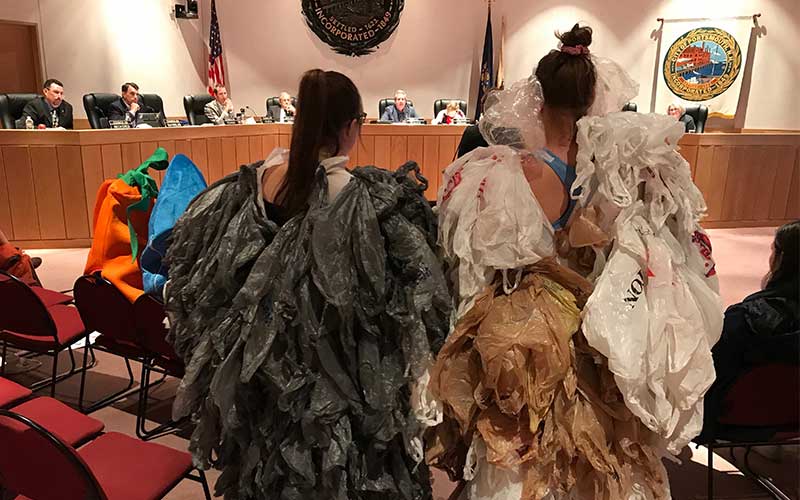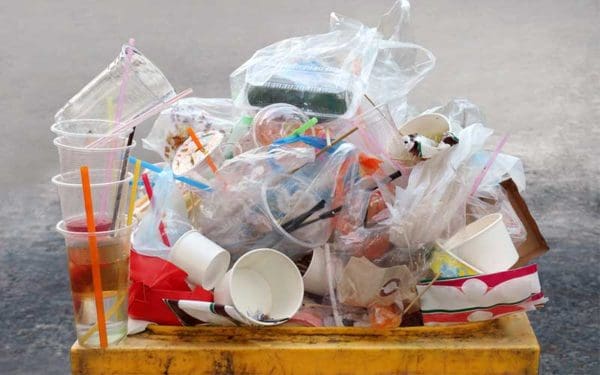
A group of Portsmouth high school students sent a powerful message to their City Council by wearing the trash they testified to reduce. Photo: Melissa Paly
What do polystyrene foam containers, paper coffee cups, and plastic grocery bags, food ware, and straws all have in common? None of them are recyclable and they cost towns and cities an enormous amount of money. What’s more, heaps of these single-use items end up on our beaches and shores, serving as an ugly reminder of our throw-away culture – a pollution source that not only threatens fish, birds, sea turtles, and marine mammals, but also their natural habitats.
While many cities and towns throughout New England – and three of the region’s states – have passed legislation banning single-use plastic products, New Hampshire has failed to address plastic pollution. That is, until now.
The Real Cost of Single-use Plastics
Waste disposal has never been cheap, but over the past several years, recycling costs have skyrocketed. To a certain extent, the cost increase is due to the high degree of contamination found in curbside recycling from single-use bags, coffee cups, polystyrene foam, and straws.
Yet the cost of single-use items goes well beyond your wallet. Polystyrene foam and other plastics, like those lining coffee cups, pose a serious risk to public health, the environment, and wildlife. Made from fossil fuels, plastic creates dangerous pollution at every stage of its life – extraction, production, use, and disposal.
Contact with plastics, including the chemicals added to consumer products, exposes us to toxics that harm our health. For example, styrene, the base molecule in polystyrene, is a carcinogen that can leach into food or drinks. What’s more, plastic breaks down into small, micro-sized pieces that remain in the environment for centuries. Wildlife often confuse these microplastics for food, which is not only detrimental to their own life, but to the rest of the food chain – including humans.
As Great Bay-Piscataqua Waterkeeper, I have seen the impact of plastic pollution up close. On our annual kayak clean-up events, volunteers spend hours paddling the bay retrieving trash both large and small. Too often, the majority of what we collect is single-use plastic. Filling a dumpster with such items year after year is both sad and infuriating.
Portsmouth Leading the Way for New Hampshire
Education, signage, and other voluntary practices to improve recycling help to raise awareness and change individual behavior, but, ultimately, it’s bans and fees that have been proven to cut waste from non-recyclable single-use items. Wanting to protect New Hampshire communities from this growing pollution crisis, CLF has been working to ban single-use plastics statewide and calling on legislators to implement a zero-waste approach to our trash.
While legislative action has stalled, our cities and towns are not waiting to address plastic pollution themselves. In a unanimous vote on October 7, Portsmouth approved a city-wide ban on polystyrene foam cups and containers and restricted single-use plastics on city-owned land – making Portsmouth the first New Hampshire city to regulate single-use plastics.
By December 2020, city properties, like parks and government buildings, and events held on city-owned land, like Market Square Day, will do away with plastic bags, charge a fee on single-use paper bags, and distribute plastic straws only on request. Disposable cups and containers will also be used only if they are compostable and composting collection is available onsite. (CLF New Hampshire Director Tom Irwin and I both advocated for these critical zero-waste initiatives to the Portsmouth City Council, and we’re excited that they were adopted into the final ordinance.)
Beyond Portsmouth: Where Does New Hampshire Go from Here?
The cost to collect and dispose of plastic trash continues to burden our cities and towns. In New Hampshire, state law requires communities to implement programs to manage solid waste. These programs must establish a solid waste hierarchy that favors trash reduction as the best approach for dealing with our waste, followed by recycling and composting. Waste disposal is the least preferred method.
The newly adopted ordinance in Portsmouth follows New Hampshire’s solid waste hierarchy. It advances the reduction of single-use waste up-front and decreases the amount of waste sent to landfills and incinerators.
We applaud Portsmouth’s bold action on this key issue, which will help to improve the health of our communities and environment, including the Great Bay estuary. But New Hampshire lags behind neighboring New England states that have passed state-wide bans. While we will continue to push for statewide action in New Hampshire, we encourage other cities and towns to follow Portsmouth’s lead and get on board the zero-waste train.



